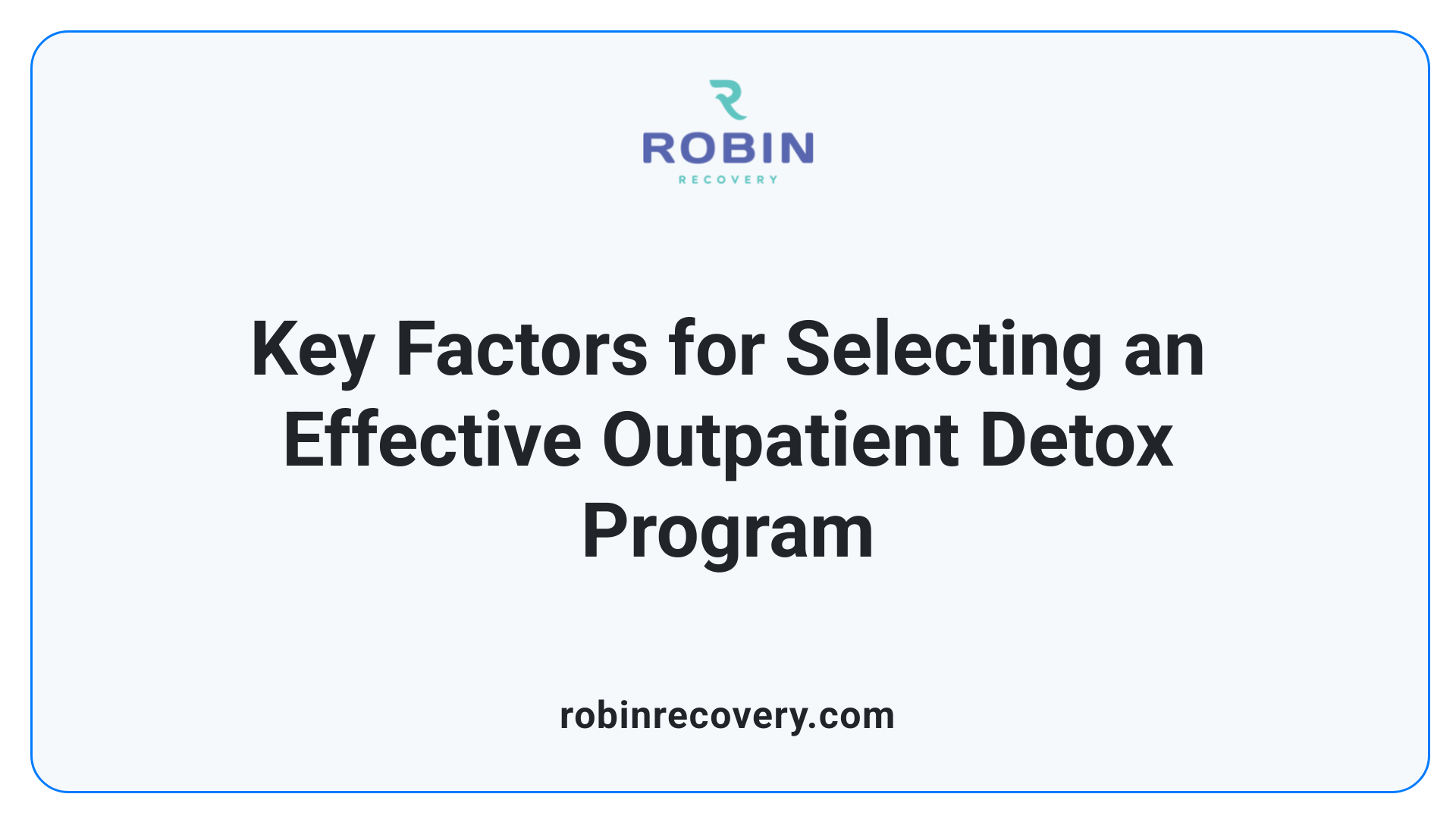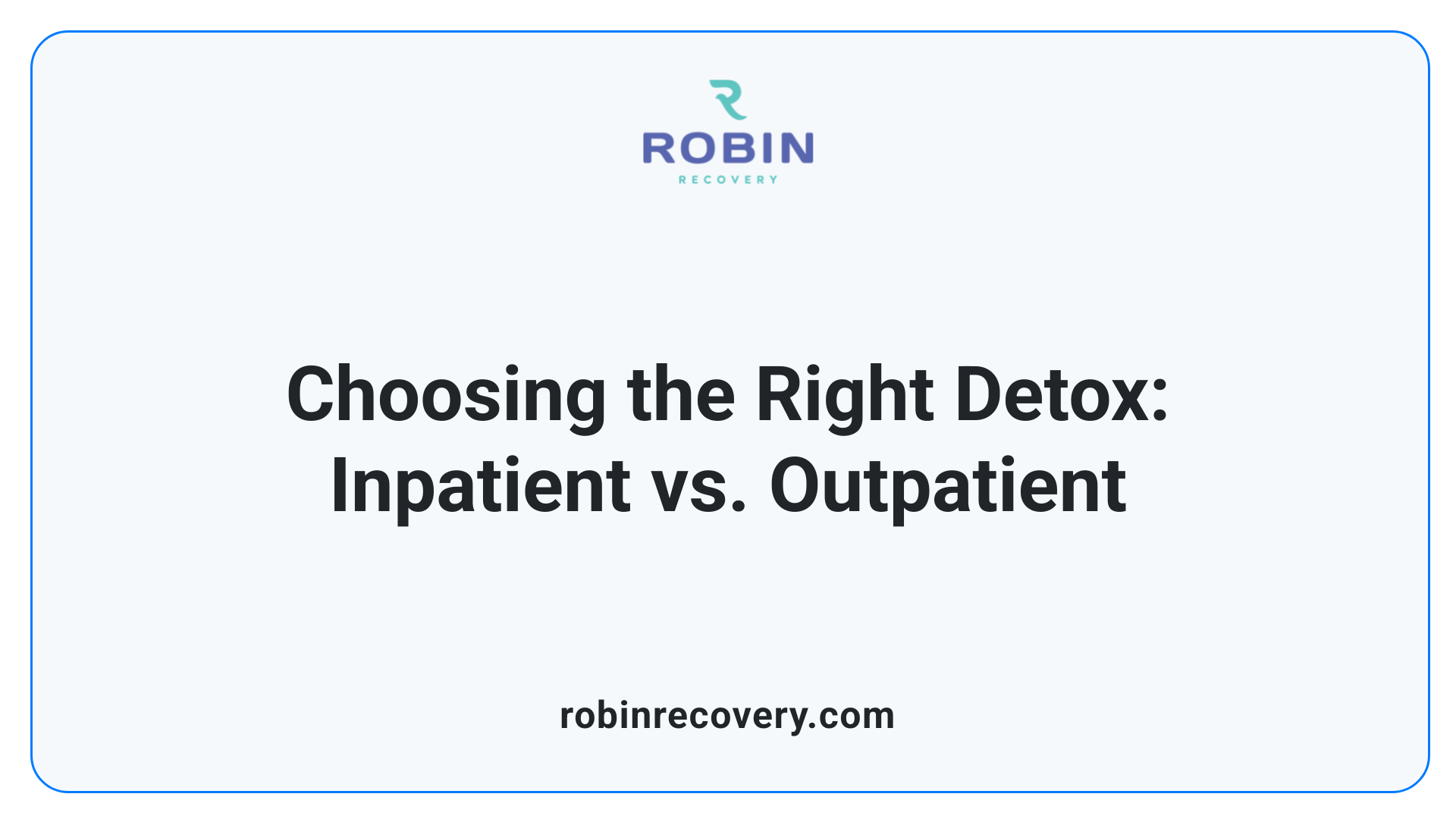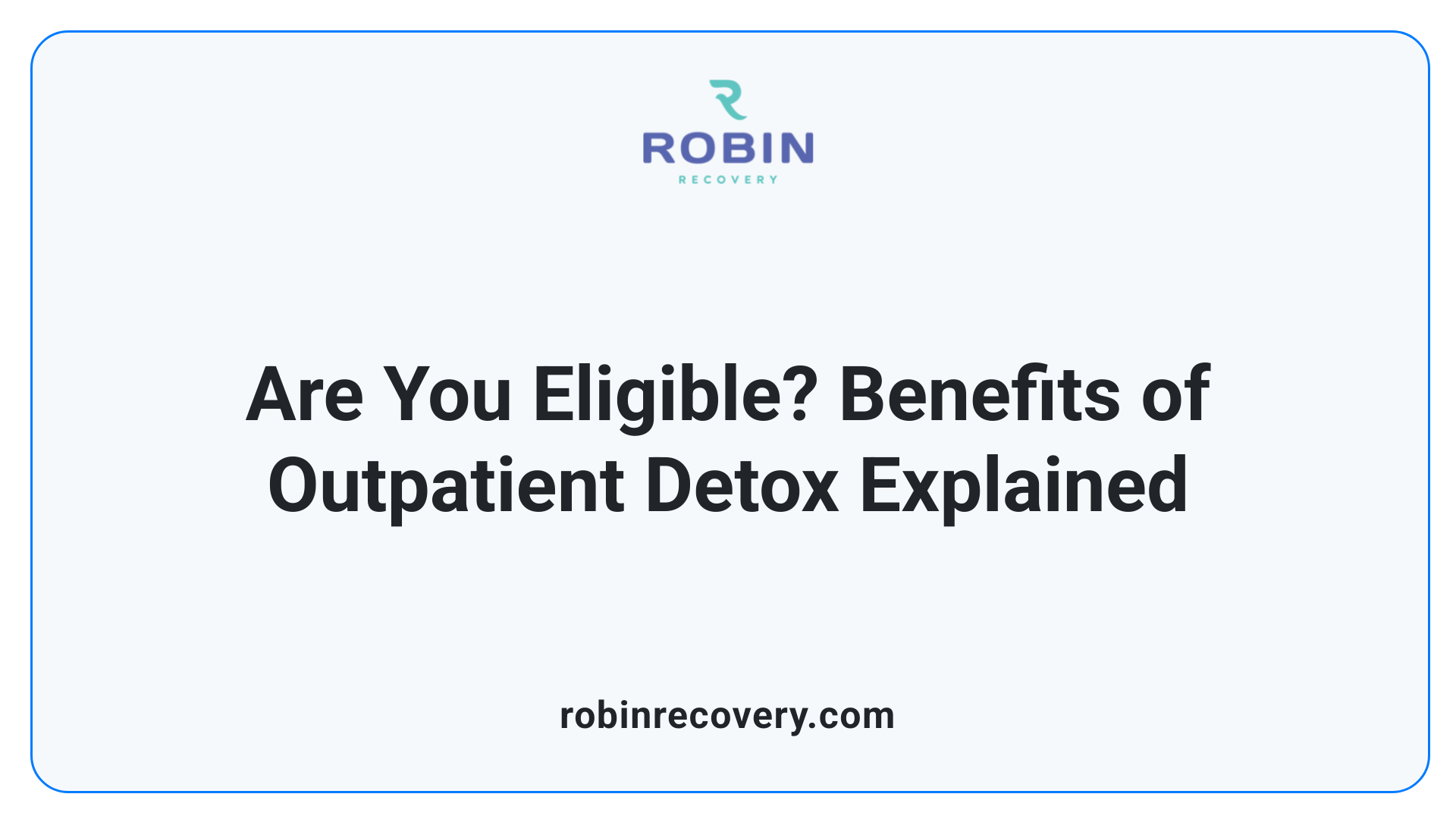How to Choose the Right Ambulatory Detox Program for Your Needs

Understanding Ambulatory Detox and Its Role in Addiction Treatment
Ambulatory detox, also known as outpatient detox, is a structured, medically supervised treatment program that allows individuals to manage withdrawal from substances while living at home. This option appeals to those with mild to moderate dependence, offering flexibility, personalized care, and the comfort of familiar surroundings. As around 82% of rehab centers favor outpatient care, understanding how these programs function and what factors to consider when choosing one is crucial for a successful recovery journey.
How Outpatient Detox Programs Operate and Their Benefits

What are outpatient detox programs and how do they work?
Outpatient detox programs are treatment plans designed to help individuals safely recover from substance dependence while living at home. These programs involve regular visits to a treatment facility for medical supervision, medication administration, and therapy sessions. Medical professionals evaluate each patient's medical history and substance use to craft personalized detox plans that meet their specific needs.
During the detox process, healthcare providers monitor withdrawal symptoms closely, adjusting medications as needed to ease discomfort and prevent complications. An average duration for outpatient detox is around a week, although this can vary based on individual circumstances. By offering flexibility and support, outpatient detox allows people to maintain their daily responsibilities, such as work, school, or family duties.
Once detoxification is complete, continuing treatment is highly recommended. Patients often transition into outpatient rehab, counseling, or support groups, which help address underlying behavioral health issues and promote long-term recovery. Overall, outpatient detox provides a safe, effective, and less disruptive alternative to inpatient hospital stays.
Key Factors in Selecting an Outpatient Detox Program

What factors should be considered when choosing an outpatient detox program?
Selecting the right outpatient detox program is a crucial step in the recovery journey. One of the most important considerations is the program’s accreditation and licensing. Reputable organizations such as the Joint Commission or the Commission on Accreditation of Rehabilitation Facilities (CARF) ensure that the facility meets high standards for safety and quality care.
Staff qualifications are equally vital. Effective programs employ licensed medical professionals, including doctors, nurses, and addiction specialists, who have experience in managing withdrawal symptoms and addiction treatment. Their expertise helps ensure safe and personalized care tailored to individual needs.
Treatment approaches can vary widely. Programs might offer medication-assisted treatment (MAT) like buprenorphine, methadone, or naltrexone for opioid dependence, as well as holistic therapies such as mindfulness, yoga, or art therapy. Your personal preference and specific substance use history should guide the choice of therapy, ensuring a more effective recovery experience.
A comprehensive outpatient program should also include various services. These often encompass individual and group counseling, mental health support, case management, and aftercare planning. These components are designed to support ongoing recovery and prevent relapse.
Location, accessibility, and insurance coverage are practical yet critical factors. Choosing a facility that is conveniently located and accessible increases the likelihood of consistent attendance. Additionally, verify whether the program accepts your insurance plan or offers flexible payment options, making treatment more affordable and easier to navigate.
When considering options, it’s helpful to research local providers, visit facilities if possible, and ask specific questions about staff credentials, treatment modalities, success rates, and costs. Consulting with healthcare professionals and using resources like SAMHSA’s treatment locator can guide you toward an informed decision that fits your unique recovery needs.
In summary, by focusing on accreditation, staff expertise, treatment methods, comprehensive services, location, and financial considerations, you can choose a program poised to support effective and sustained recovery from substance use disorder.
Evaluating and Selecting a Suitable Outpatient Detox Facility
When choosing an outpatient detox center, thorough evaluation is essential to ensure safety, effectiveness, and comfort. Start by verifying that the facility is accredited and licensed by reputable organizations such as The Joint Commission or relevant state health authorities. Accreditation indicates compliance with high standards of care and quality.
Examine the staff's credentials and expertise. Reputable facilities employ licensed medical professionals, counselors, and addiction specialists experienced in outpatient detox. Knowing that qualified, certified professionals are overseeing treatment adds an extra layer of security.
A comprehensive program offers various therapy options and support services. Look for treatment plans that include evidence-based therapies like cognitive-behavioral therapy (CBT) or motivational interviewing (MI). Access to additional services such as mental health support, family therapy, and detailed aftercare planning can significantly improve recovery outcomes.
Patient reviews and success stories provide insight into the facility’s effectiveness and patient satisfaction. Additionally, confirm whether the center accepts your insurance or offers flexible payment plans to manage costs. Gathering this information enables you to select a program tailored to your needs, promoting a smoother recovery journey.
Inpatient vs. Outpatient Detox: Making the Right Choice

What is the difference between outpatient and inpatient detox, and how do you choose the right level of care?
Inpatient detox means staying at a residential treatment center, where individuals receive round-the-clock medical supervision and support during withdrawal. This setting is best suited for severe addiction cases, especially when there is a risk of dangerous withdrawal symptoms or co-occurring mental health disorders.
Outpatient detox, on the other hand, allows individuals to live at home while attending scheduled treatment sessions. It is typically appropriate for those experiencing mild to moderate withdrawal symptoms who have a stable home environment and strong support systems.
Choosing between inpatient and outpatient care depends on several factors. The severity of withdrawal symptoms, the person’s medical and mental health history, and their support network all influence the decision.
Inpatient programs provide intensive care, continuous monitoring, and comprehensive services to ensure safety. Outpatient detox offers greater flexibility, enabling individuals to maintain work, family responsibilities, and daily routines.
Ultimately, a healthcare professional's assessment is crucial to determine which level of care is most suitable. This ensures the process is both safe and effective, supporting long-term recovery.
Assessing Eligibility and Benefits of Outpatient Detox

What are the eligibility requirements and benefits of outpatient detox programs?
Outpatient detox programs are designed for individuals who are medically stable and have sufficient support systems to manage the withdrawal process at home. To qualify, patients typically need to be residents of their state—such as Texas—and at least 18 years old. They must be diagnosed with a substance use disorder that does not require intensive inpatient supervision. A crucial factor is the ability to handle withdrawal symptoms safely without immediate risk of medical complications.
The primary advantages of outpatient detox include the flexibility to continue daily responsibilities such as work, school, or family commitments. This flexibility makes outpatient programs accessible and less disruptive to personal life. Cost-effectiveness is another benefit, as outpatient care generally costs less than inpatient treatment due to fewer facility-based expenses.
Beyond convenience, outpatient detox offers comprehensive and personalized care. Patients undergo medical assessments, receive medications if necessary, and participate in counseling sessions and recovery education. These programs help address not only physiological dependence but also emotional and behavioral issues related to addiction.
However, outpatient detox isn't suitable for everyone. It is most appropriate for individuals with mild to moderate withdrawal symptoms and strong support systems at home. Those with severe medical or psychiatric conditions, high risk of relapse, or unstable living environments may require inpatient care.
In summary, outpatient detox can effectively support many in their recovery journey by providing medically supervised detoxification in a familiar setting. The combination of medical oversight, personalized treatment, and the comfort of remaining at home makes it a valuable option for suitable candidates.
Matching Personal Needs with Detox Options

Deciding on the most suitable detox approach depends on thorough assessment of individual circumstances. The first step involves evaluating the severity of addiction, considering how long and how heavily the person has been using substances. This includes understanding any other medical or mental health issues that might influence treatment needs.
A comprehensive initial assessment by healthcare professionals is crucial. This typically covers physical health, psychological state, substance use history, and social support systems at home. For example, people with mild to moderate withdrawal symptoms and stable home environments may find outpatient detox appropriate.
Support systems and safety are important considerations. Strong family or community support can significantly impact success in outpatient programs. Conversely, those with unstable living conditions or complex medical needs might require inpatient detox with 24-hour supervision.
Consulting with healthcare providers allows for tailored recommendations. Professionals evaluate all factors—medical complications, mental health conditions, and personal responsibilities—to determine if outpatient or inpatient detox best fits the individual's needs.
Ongoing evaluations, including mental health and physical check-ups, guide adjustments to the treatment plan. This ongoing oversight ensures that the chosen detox setting remains safe and effective throughout the process.
In essence, matching personal needs with detox options is a nuanced process that emphasizes safety, medical suitability, and support system strength to achieve successful recovery.
Making an Informed Decision for Lasting Recovery
Choosing the right ambulatory detox program is a critical step towards overcoming substance dependence and building a healthier future. By carefully evaluating factors such as accreditation, staff expertise, treatment approaches, and personal circumstances, individuals can find a program that offers safe, effective, and personalized care. Engaging with healthcare professionals for assessments and questions ensures that the selected program aligns with specific needs and safety requirements. Remember, outpatient detox is most beneficial for those with mild to moderate dependence and stable environments, but professional guidance is essential to determine the appropriate level of care. With thoughtful planning and support, you can set the foundation for lasting recovery and improved well-being.
References
- Find the Best Ambulatory Detox Center - Bridge Back To Life
- 2 Settings, Levels of Care, and Patient Placement - NCBI
- How Ambulatory Detoxification Works | Outpatient Detox in Tampa
- Outpatient Drug & Alcohol Detox Centers Near You
- Ambulatory Detox | 4 Key Benefits for Safe Recovery
- Inpatient vs. Outpatient Drug Detox in CA | Olympia House Rehab
- Inpatient Vs. Outpatient Rehab - Addiction Center
- What Is Ambulatory Detox? - Athens Area Commencement Center
- How to Choose a Detox Program - Relief Recovery Center
